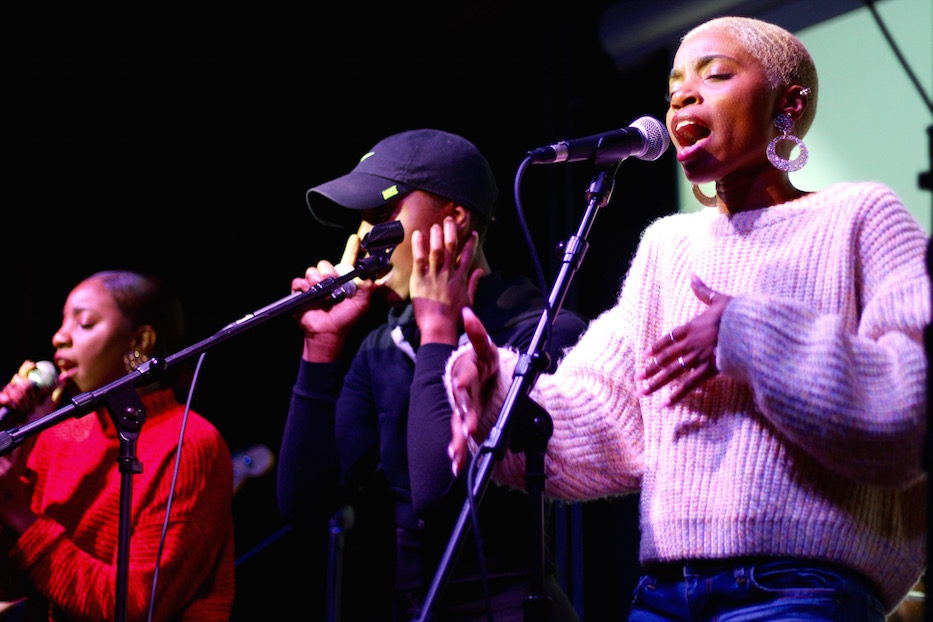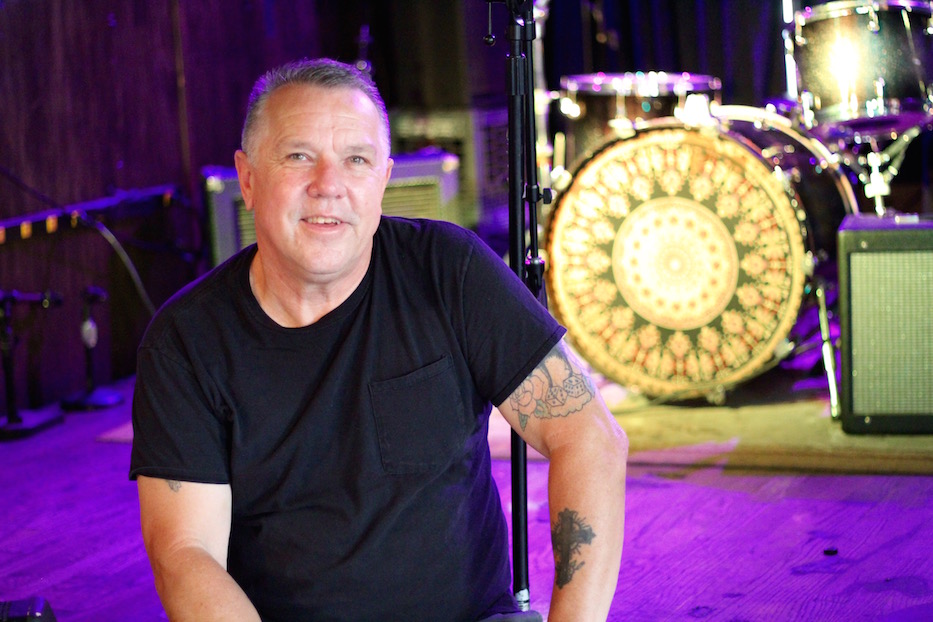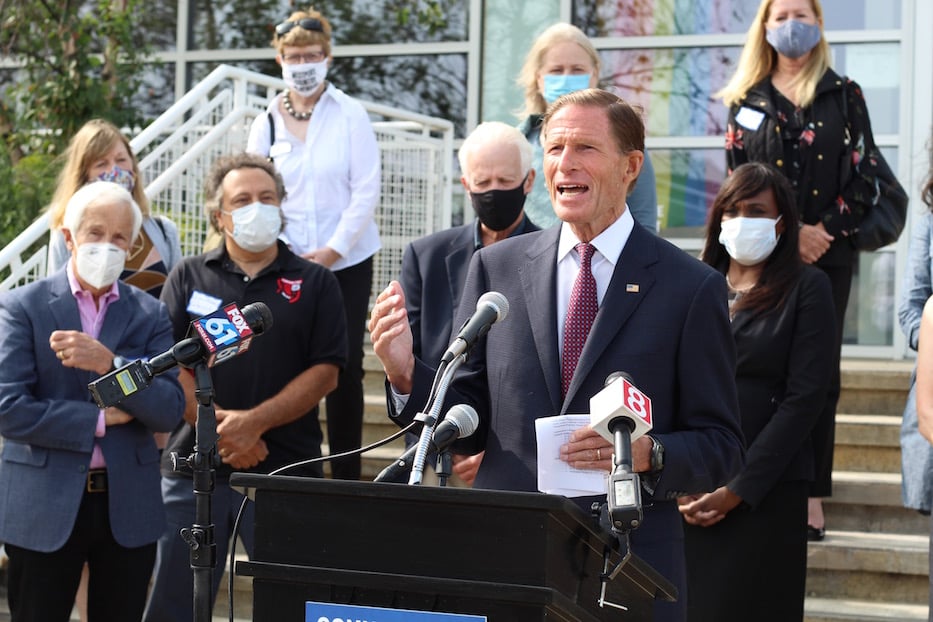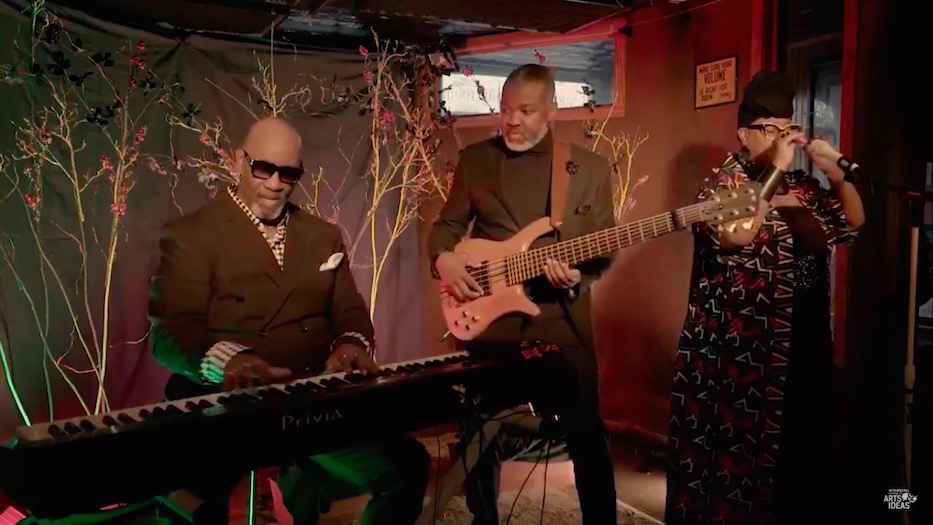
Downtown | Economic Development | Music | Arts & Culture | Theater | COVID-19

Paul Mayer earlier this year. He removed his mask only for the photo. Lucy Gellman Photo.
Paul Mayer has spent nine months wondering if his Crown Street music venue is going to make it through COVID-19. Now, a new infusion of federal dollars may help him survive through the spring.
Mayer is the owner of Cafe Nine, a Crown Street music mainstay that has been largely closed to the public since March. Early this week, he was one of dozens of venue owners across the state—and thousands around the country—to celebrate the passage of the $15 billion Save Our Stages Act. The act is part of the $900 billion federal relief package that passed in Congress Sunday afternoon.
“I'm excited about it,” he said Tuesday, reached by phone. “I think it will be a lifeline for us in getting us through the final phase of this. I'm waiting for info on how we're applying for it. We're certainly not generating any income, and I think this means we're able to hold on a little longer. It's been a long haul.”
The act has come after months of advocacy and vocal bipartisan support from Congress, arts venues, and the National Independent Venue Association (NIVA). Once signed, it will allow independent theaters, music venues, and performing arts organizations to apply for up to $10 million in relief from the U.S. Small Business Administration (SBA). It was initially introduced by U.S. Sen. John Cornyn, a Texas Republican, and U.S. Sen. Amy Klobuchar, a Minnesota Democrat, in late July.

U.S. Sen. Richard Blumenthal at a press conference for the Save Our Stages Act outside Long Wharf Theatre in September 2020. Lucy Gellman Photo.
U.S. Sen. Richard Blumenthal signed on as an early co-sponsor at the end of July. He has since spoken on the value of performing arts venues across the state, including at the Warner Theatre in Torrington, Long Wharf Theatre in New Haven and a virtual roundtable earlier this month.
The $15 billion measure comes as independent venues reel from cancelled and postponed seasons, with no immediate end in sight. Across the state, theaters have announced millions of dollars in projected losses, including furloughs and layoffs that have come in waves and left skeleton crews in houses meant to seat thousands of people. While the state recently distributed $9 million in federal CARES Act funding, many organizations are still struggling to stay afloat. Others did not qualify for the $9 million because they did not fit the state guidelines (the New Haven Pride Center, which holds rotating exhibitions in its space, was one such example).
As of Tuesday evening, U.S. President Donald Trump placed the package’s future in doubt, demanding eleventh-hour changes before he signed it. Tuesday morning and afternoon, however, local venue owners and artistic staff expressed their excitement for the bill, which many framed as long overdue.
“This relief bill is huge,” said Slate Liu-Ballard, who runs The State House with co-owner Carlos Wells. “We're not in some speedy mode to start doing concerts again. We're gonna be some of the last ones to reopen, so this money provides us with hope. It's gonna be a tiptoeing towards reopening.”

Scenes from the December 2019 Jam at The State House. The Jam has been cancelled since March, as the venue remains closed. Lucy Gellman File Photo.
For the past nine months, the venue has remained in limbo, he said. The State House officially closed its doors March 16, following statewide orders from Gov. Ned Lamont. Liu-Ballard watched as weeks, and then months, of shows disappeared from the venue’s roster. He hasn't been able to pay rent since April, and praised Beacon Properties for working with the venue to allow it to stay for the moment. He estimated $200,000 in financial losses since mid-March.
While he has opened the space to a few fellow bands, it isn’t bringing in substantial revenue. Each month, The Let Loose rehearse there, and recently recorded a Christmas song that they dropped earlier this month. S.G. Carlson & The Tines also recently recorded a music video on a stage that has been otherwise empty. After starting this year packed to the gills for a jam session, Liu-Ballard said it feels lonely. While the venue secured “a little” in Paycheck Protection Program (PPP) funding, the money dried up months ago.
He added that even with the bill, he wonders when artists will realistically feel safe touring—and when they’ll have places to safely play—again.
“All these virtual streams, they're not producing income for anybody,” he said. “The bill is huge. For venues across the US, it's huge. The State House is here. We want to reopen, we want to start doing the stuff that we were doing, and we don't know what it's going to look like.”

Chris "Big Dog" Davis, who recorded a 2020 Christmas concert for the International Festival of Arts & Ideas at Cafe Nine. Screenshot from YouTube.
Mayer, whose venue sits just down the block at the intersection of State and Crown Streets, said that he’s excited to learn more about Save Our Stages legislation, a portion of which is ostensibly earmarked for smaller venues.
After shutting down Cafe Nine completely in March, he has experimented with new potential streams of revenue, from a virtual tip jar for employees to t-shirt sales and rehearsal space. This fall, he rolled out performances on the roof and a weekend menu from Firehouse 12. While all of them brought in money, none of them closed the gap in lost income.
He praised New Haven musicians and artists for their support of the space, including a recent “Covidtorium” fundraiser from NHDocs co-founder Gorman Bechard and musician and producer Dean Falcone. But, he added, there’s no replacement for federal relief. This year, he received both Paycheck Protection Program (PPP) and Emergency Loan (EIDL) funding. He said that he hopes the Save Our Stages funding comes as a grant, as not to drive him into debt.
“Hopefully this [the distribution of funding] will go fairly quickly,” he said. “It's always risky when the money is coming from the federal government. We're operating on these very small margins, and they don't understand it.”
“There has been a real sense of community” during this time, he added. “You go about your daily business and you don't think much about what you're doing. When people come around and support you it's really quite humbling.”
Tuesday, several of New Haven’s larger venues also said they are excited to see the bill pass with the Save Our Stages Act intact. Keith Mahler, president of Premier Concerts, called the news “phenomenal” in a phone call Tuesday afternoon.

Trombone Shorty at College Street Music Hall in 2017. Photo Courtesy College Street Music Hall.
Premier Concerts was able to salvage some of this year's income with outdoor concerts at South Farms, an outpost in Morris, Conn. that attracted over 22,000 people for a total of 45 shows in 75 days. Its New Haven and Hamden venues, College Street Music Hall and the Space Ballroom, have been quiet since March.
“It's a great piece of legislation,” he said. “We're very active with NIVA, and we're thrilled that the act got passed. It's exactly what the industry needs to keep it from evaporating. it's been a devastating year.”
Carla Sullivan, vice president of external relations for the Shubert Theatre, said the Shubert is equally excited for the bill and waiting to see what it means for the theater. In March, COVID-19 forced the theater to cancel four shows on a ten-show season, including touring productions of Waitress and Once On This Island that were expected to do particularly well. Within weeks, it had furloughed hundreds of part-time employees who worked in the box office and behind the scenes.
It has since cut its full-time staff from 14 employees to just five. Because the Shubert owns its building, it doesn’t have to factor in rent when many other venues do. While it has held a remote summer camp and three iterations of its “Next Stop New Haven” fundraiser, neither has been particularly profitable. Sullivan said the theater will be taking its cues from Broadway, which has announced closures through June of next year.
She added that keeps thinking of Senate Minority Leader Chuck Schumer, who has called arts venues “the lifeblood of our communities” and pointed out repeatedly that “they were the first to close and will be the last to open.” Prior to COVID-19, Connecticut’s arts and culture sector generated $9 billion, 57,000 jobs, and five percent of the state’s economy.
“Financially, we are okay, but we are only okay because we’ve taken drastic measures in laying people off,” Sullivan said. “I do think it's a recognition of the value that these venues, that these institutions have. In downtown New Haven, our venues have been very quiet the past nine months.”
In a press conference outside the State Capitol Tuesday afternoon, U.S. Senators Chris Murphy and Richard Blumenthl both lambasted Senate Majority Leader Mitch McConnell for slashing trillions of dollars from the relief bill. The final bill is a shadow of the $2.2 trillion package that House Democrats pushed for in October, down from a proposed $3.4 trillion in May.
“Let me just say about the pandemic relief bill, it is a life raft,” Blumenthal said Tuesday. “It’s a rescue. It provides some breathing room in a down payment to a new administration that has no time to waste in doing a second pandemic relief bill. And let me be very blunt. This pandemic relief bill is like a shot in the arm to our economy, much like the vaccines that people are getting in their arm. Like those vaccines, there has to be a second dose.”
“Save Our Stages will mean literally tens of millions of dollars to the venues, theaters, concert halls, clubs throughout Connecticut,” he later added. “Whether it is the Bushnell right down the block, or the Long Wharf, the Warner, the Palace, the Goodspeed — these theaters can stay viable. The show will go on.”

